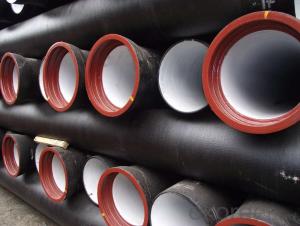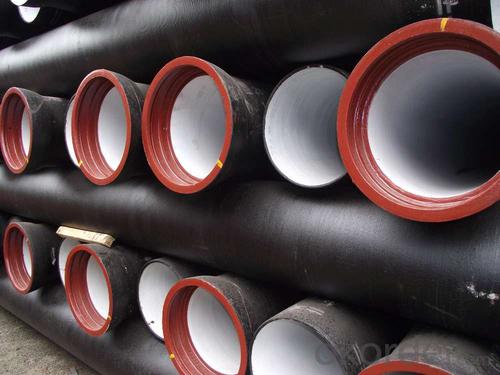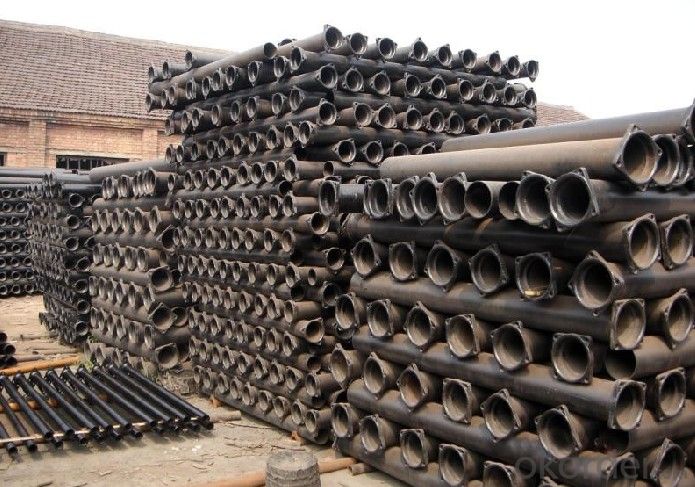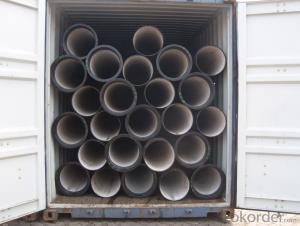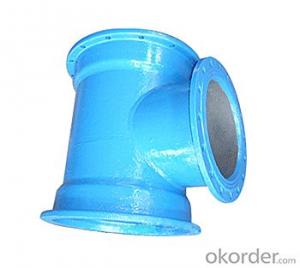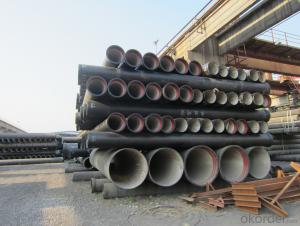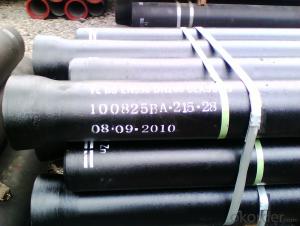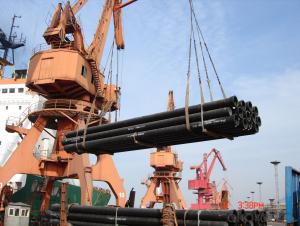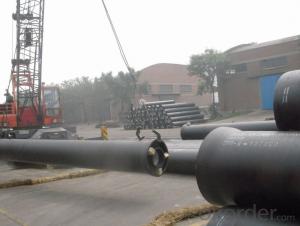Ductile Iron Pipe C40 DN300-DN900 ISO2531 for Water Supply
- Loading Port:
- China main port
- Payment Terms:
- TT or LC
- Min Order Qty:
- 20 m.t.
- Supply Capability:
- 200000 m.t./month
OKorder Service Pledge
OKorder Financial Service
You Might Also Like
1,Ductile Iron Pipe Description :
Ductile Iron pipe are manufactured according to ISO 2531 or BS EN545 or BS4772 FOR POTABLE WATER ,internal is cement lining or wet epoxy coating;External is zinc plus bitumen or wet epoxy coating. We also manufacture ductile iron fittings with fusion bonded epoxy both inside and outside. All the producets are sutible to water pipes fields.
1) Pipes confirm to ISO2531,K9 class,T type joint,6m long,with inside cements lining conform to ISO4179, outside Zinc spraying(130g/m2) and bitumen coating(70μm) conform to ISO8179.
2) Pipe ends: Spigot and socket ends, with 100% SBR rubber gaskets
accoding to ISO4633
3) we can do third party inspection according to customer's request.
4) Our products have been sold to many international market,
such as Middle East and South East Asia and Africa.
2,Main Features of the Ductile Iron Pipe:
·High yield strength
·High tensile Strength
·High corrosion resistance
·Pressure Resistence
·Anti-corrosion
·Installation is convenient
·Satisfy the highest hygienic standards
. Internal Lining: Cement, conform to ISO4179
. External coating: Zinc + Bitumen, conform to ISO8179
. Rubber: NBR, SBR, EPDM according to ISO4633 / EN681.1
. Note: The gaskets, bolts & nuts are supplied respectively as your special requirement
3,Ductile Iron Pipe Images:
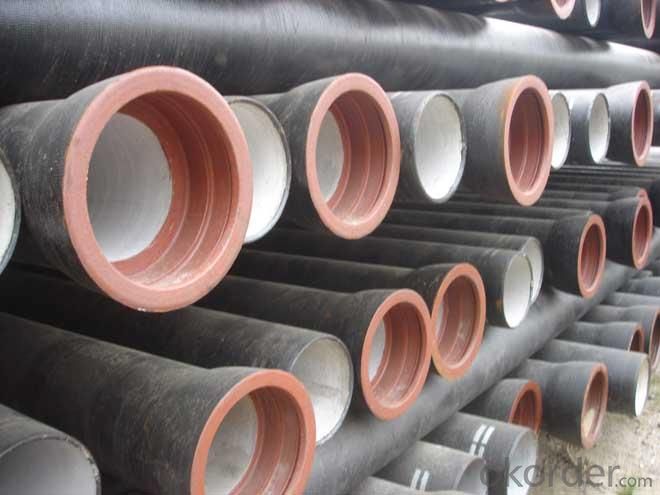
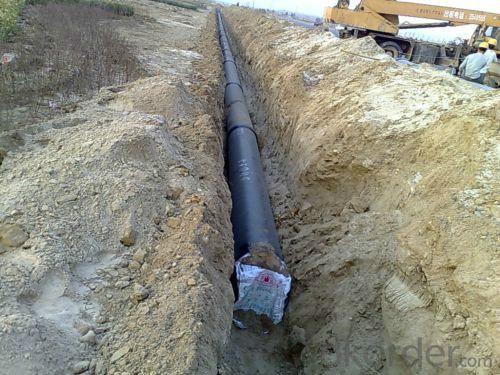
4. Ductile Iron Pipe Specification
Surface Finishes:Bare, Oiled, Mill Varnish, Galv,FBE, FBE Dual, 3LPE, 3LPP, Coal Tar,Concrete Coating and Tape Wrap
End Finishes: Beveled, Square Cut, Threaded, hat
Additional Services: Internal Coating
Packaging: packed in bag, plastic bag, steel strip, steel wire,double wire, iron box, wooden box,
tarpaulin, plastic sheeting
Test :X-ray, UT, magnetic particle,inspection,hydrostatic test.
Processing service :Beveling, Threading, Slotting, Cut-to length, Bends, Quench and Temper, Fabrication, Double-jointing and On-site assistance
Documentary MTC: material certification,Origin certification, CI or PI,Test Report, export licence, handling order, B/L,insurance policy,shipping instructions, contract, packing list etc.
5.FAQ:
We have organized several common questions for our clients,may help you sincerely:
1.Q: Why would you choose ductile iron pipe rather than other pipe materials?
A:The reasons are obvious for that not only ductile iron pipe possesses the inherent strength and flexibility of ductile iron, combined with proven corrosion protection systems, but also the cost savings can be achieved from design to installation and commissioning.
2.Q:Why can you guarantee the inner of pipes can’t be corroded?
A: High alumina cement mortar lining and sulphate-resistant cement mortar lining. These two special linings are applicable to inner anti-corrosion for sewage pipes, improving resistance to erosion of the sewage components.
- Q: Can ductile iron pipes be used for agricultural applications?
- Yes, ductile iron pipes can be used for agricultural applications. Ductile iron pipes are known for their durability, strength, and corrosion resistance, making them suitable for various agricultural applications such as irrigation systems, water supply networks, and drainage systems.
- Q: Are ductile iron pipes resistant to microbiologically induced corrosion?
- Yes, ductile iron pipes are generally resistant to microbiologically induced corrosion (MIC). Ductile iron is a type of cast iron that has been treated with magnesium to give it increased strength and flexibility. This treatment creates a protective layer on the surface of the iron, making it less susceptible to corrosion caused by microorganisms. MIC occurs when certain types of bacteria, fungi, or other microorganisms interact with the metal surface of pipes and produce corrosive byproducts. However, ductile iron is generally resistant to MIC because the protective layer formed during the manufacturing process acts as a barrier, preventing microorganisms from directly contacting the metal surface. Additionally, ductile iron pipes are often lined with cement mortar or other protective coatings, which further enhance their resistance to corrosion. These linings provide an additional layer of protection against microorganisms, reducing the potential for MIC. Despite these inherent resistance properties, it is important to note that the resistance to MIC can vary depending on the specific conditions and environment in which the pipes are installed. Factors such as water quality, temperature, and the presence of certain microorganisms can influence the susceptibility of ductile iron pipes to MIC. Therefore, it is essential to consider these factors and take appropriate measures to prevent MIC, such as regular monitoring of water quality, proper maintenance, and the use of corrosion inhibitors or biocides when necessary.
- Q: Do ductile iron pipes require external coatings or wraps?
- Yes, ductile iron pipes typically require external coatings or wraps for protection against corrosion. While ductile iron is known for its strength and durability, it is still susceptible to corrosion over time when exposed to certain environmental conditions. External coatings or wraps provide an additional layer of protection to the pipes, helping to prolong their lifespan and maintain their structural integrity. These coatings can vary and may include materials such as epoxy, polyethylene, or zinc, which act as a barrier between the pipe surface and corrosive elements in the surrounding environment. Additionally, wraps made of materials like polyethylene or polypropylene can also be used to provide mechanical protection against external factors such as impact or abrasion. Therefore, it is generally recommended to apply external coatings or wraps to ductile iron pipes to enhance their resistance to corrosion and ensure their long-term performance.
- Q: Can ductile iron pipes be used in oil or gas transmission pipelines?
- Ductile iron pipes are applicable for oil or gas transmission pipelines. They belong to the cast iron category and possess enhanced characteristics, including increased tensile strength and ductility. These properties make them suitable for various applications, including pipeline systems used in oil and gas transmission. The corrosion resistance of ductile iron pipes is exceptional, which is crucial for pipelines that transport oil or gas over long distances. This material exhibits a high resistance to external factors such as soil chemicals, moisture, and corrosive gases commonly found in the oil and gas industry. Moreover, ductile iron pipes can endure high pressures and temperatures, making them suitable for the demanding requirements of oil and gas transmission. Moreover, ductile iron pipes have excellent impact resistance, enabling them to absorb and withstand external forces such as ground movement or heavy loads. This durability ensures the integrity and longevity of the pipeline system, minimizing the risk of leaks or failures. In summary, ductile iron pipes provide a reliable and cost-effective solution for oil and gas transmission pipelines. Their robustness, corrosion resistance, and ability to withstand high pressures and temperatures make them a viable choice for this critical infrastructure.
- Q: What is the minimum operating temperature for ductile iron pipes?
- Ductile iron pipes typically have a minimum operating temperature of -40 degrees Celsius, showcasing its exceptional strength and ductility in cold conditions. This makes it a versatile option for various purposes, such as water and wastewater systems. Nevertheless, it is crucial to acknowledge that the specific minimum operating temperature may differ based on factors such as the grade of ductile iron employed and the requirements of the application. It is highly advisable to refer to the manufacturer's specifications and guidelines for the appropriate utilization and optimal performance of ductile iron pipes in cold temperatures.
- Q: Are ductile iron pipes suitable for industrial applications?
- Yes, ductile iron pipes are highly suitable for industrial applications. Ductile iron is a strong and durable material that possesses excellent mechanical properties, making it ideal for handling high-pressure and heavy-duty applications. The pipes have a high tensile strength and can withstand extreme conditions, including high temperatures and corrosive environments. Furthermore, ductile iron pipes have superior resistance to cracking and fracturing, ensuring a longer lifespan and reduced maintenance costs. They are also highly resistant to external loads, making them suitable for underground installations and industrial settings where they may be subjected to heavy loads or vibrations. Moreover, ductile iron pipes have excellent flow characteristics due to their smooth interior surface, allowing for efficient fluid transportation in industrial systems. They also have good resistance to wear and abrasion, ensuring a consistent flow rate over time. Additionally, ductile iron pipes are versatile and can be used in various industrial applications such as water supply, wastewater treatment, industrial processes, and mining operations. They are available in a wide range of sizes to accommodate different requirements and can be easily connected using various jointing methods. Overall, ductile iron pipes offer the reliability, strength, and longevity required for industrial applications, making them a suitable choice for industries where durability and performance are crucial.
- Q: Is the ambient temperature at minus 20 degrees better with grey cast iron or ductile iron?
- Ductile iron castings have been used in almost all major industries. These departments require high strength, plasticity, toughness, wear resistance, and resistance to ductile iron
- Q: Can ductile iron pipes be used for underground fire protection systems?
- Ductile iron pipes are indeed applicable for underground fire protection systems. Their exceptional strength and durability render them suitable for enduring the intense pressure and high temperatures that may arise during a fire. Moreover, these pipes exhibit significant resistance to corrosion, a vital attribute for long-term underground usage. In addition, they possess exceptional flow characteristics, enabling swift and efficient water delivery for extinguishing fires. All in all, ductile iron pipes prove to be a dependable and efficient selection for underground fire protection systems.
- Q: Are ductile iron pipes suitable for use in oil refineries?
- Yes, ductile iron pipes are suitable for use in oil refineries. Ductile iron is a type of cast iron that offers a unique combination of strength, durability, and flexibility, making it an excellent choice for various applications, including oil refineries. One of the key advantages of ductile iron pipes is their high tensile strength, allowing them to withstand the high pressure and stress commonly found in oil refining processes. This strength is crucial for the transportation of various fluids, including crude oil, refined petroleum products, and chemicals within the refinery. Additionally, ductile iron pipes have excellent corrosion resistance properties, making them highly resistant to the corrosive effects of oil, chemicals, and other substances typically present in oil refineries. This corrosion resistance ensures the longevity and reliability of the pipes, reducing the need for frequent maintenance and replacement. Furthermore, ductile iron pipes have exceptional ductility, which means they can absorb and withstand significant impacts and vibrations without fracturing or breaking. This quality is advantageous in oil refineries where there may be frequent movement or potential stressors due to machinery, equipment, or ground settlement. Moreover, ductile iron pipes have a smooth interior surface that reduces friction, allowing for efficient fluid flow and minimizing pressure loss. This characteristic is essential in oil refineries, as it helps optimize the transportation of fluids, ensuring a smooth and reliable production process. In conclusion, ductile iron pipes are suitable for use in oil refineries due to their high tensile strength, corrosion resistance, ductility, and smooth interior surface. These pipes provide a reliable and durable solution for transporting various fluids within the refinery, contributing to the efficient and safe operation of oil refining processes.
- Q: Can ductile iron pipes be used for wastewater treatment plants?
- Yes, ductile iron pipes can be used for wastewater treatment plants. Ductile iron pipes are known for their strength and durability, making them suitable for handling the harsh and corrosive environment of wastewater treatment plants. These pipes can withstand high pressures and are resistant to corrosion, which is essential in handling wastewater and various chemicals involved in the treatment process. Ductile iron pipes also have the advantage of being easy to install and maintain, with a long service life. Therefore, they are commonly used in wastewater treatment plants for transporting and distributing wastewater throughout the facility.
Send your message to us
Ductile Iron Pipe C40 DN300-DN900 ISO2531 for Water Supply
- Loading Port:
- China main port
- Payment Terms:
- TT or LC
- Min Order Qty:
- 20 m.t.
- Supply Capability:
- 200000 m.t./month
OKorder Service Pledge
OKorder Financial Service
Similar products
Hot products
Hot Searches
Related keywords
